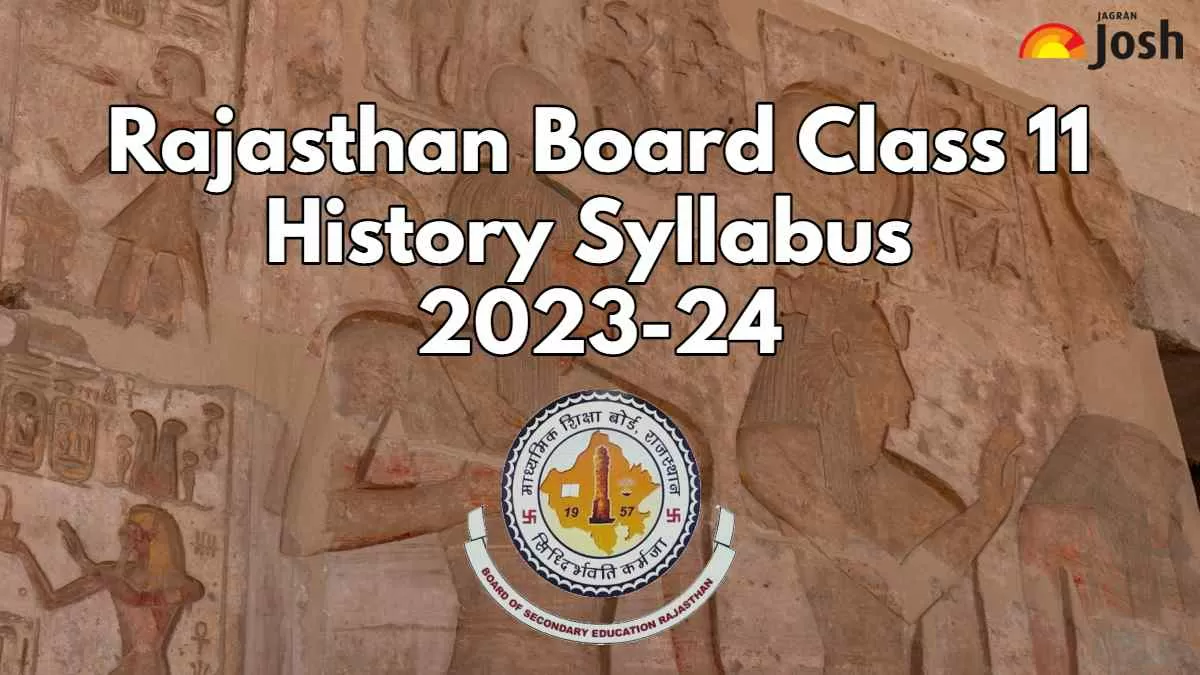Rajasthan Board Class 11 History Syllabus for 2024 Exam: The Rajasthan Board of Secondary Education (RBSE) is a significant educational authority in the state. Established to regulate and enhance the quality of education, RBSE manages curriculum design, conducts exams, and grants affiliations to schools. It administers both secondary and senior secondary education, focusing on subjects spanning the Humanities, Science, Commerce, and Vocational streams.
Read: RBSE Class 11th Syllabus 2023–24: Download the New Syllabus PDF, Subject-Wise List
Here, you will find the newly released syllabus for RBSE Class 11 History. It is one of the important subjects in the Arts stream, and students should know what topics they need to study and what not to. After the pandemic and the release of a new national educational policy, the educational boards are revising their syllabus. Thus, you should follow the new syllabus to avoid covering any unrequired topics for your final exams. Below is the detailed syllabus for Rajasthan Board Class 11 History. You may read the syllabus in this article or download the complete syllabus in PDF format from the link provided below.
राजस्थान बोर्ड 11th History Course Structure 2024
| Section No. | Section Name | Marks Allocated |
| 1 | Early Societies | 15 |
| 2 | Empires | 25 |
| 3 | Changing Traditions | 25 |
| 4 | Towards Modernisation | 35 |
| Total | 100 |
RBSE Class 11th History Syllabus 2023-24
| Section-1 EARLY SOCIETIES |
| Theme-1 Writing and City Life Mesopotamia and its geography, the significance of urbanization in Southern Mesopotamia Temples and kings, life in the city. A trading town in a pastoral zone, cities in Mesopotamian culture, the legacy writing. |
| Section-2 EMPIRES |
| Theme-2 An Empire Across Three Continents The early empire, the third-century crisis, gender, literacy, culture, economic expansion, controlling workers, social hierarchies, late antiquity. |
| Theme 3 Nomadic Empires Introduction, social and political background, the career of Genghis khan the mangols after Genghis khan, Social, Political and military organisation, conclusion: situating Genghis khan and the mangols in world History |
| Section:-3 CHANGING TRADITIONS |
| Theme-4 The Three Orders An introduction to feudalism frame and England, the three order, the second order: the nobility the manorial Estate, the knights, the church and society, the third order: peasants, free and unfree England, factory affecting social and economic relations, the environment, land use, new agricultural technology. A forth order new town and townspeople, cathedral - towns, the crisis of the fourteenth century. social un rest, political change. |
| Theme-5 Changing Cultural Traditions The revival of Italian cities, universities and humanism, the humanist view of history, science and philosophy the arabs contribution, artists and realism, architecture the first printed books, a new concept of human beings, the aspirations of women, debates within Christianity, the Copernican revolution, reading the universe was there a European Renaissance in the fourteenth century |
| Section-4 TOWARDS MODERNISATION |
| Theme 6 Displacing Indigenous Peoples European imperialism, north America, the native people encounters with Europeans, mutual perceptions, the native peoples lose their land the gold rush and the growth of industries, institutional nights, the winds of change. Australia the winds of change |
| Theme-7 Paths To Modernisation Japan, the political system, the Meiji restoration, modernising the economy industrial workers, aggressive nationalism westernisation and tradition, daily life overcoming modernity after defect re-emerging as a global economic power china. Establishing the republic, the rice of the communist of china establishing the new democracy 1949-65 conflicting visions 1965-78, reforms from 1978 the story of Taiwan. the sky of Korea, rapid industrialisation under strong leadership. continued economic growth and calls for democratisation, Korean democracy and IMF crisis, two roads to modernization. |
